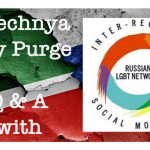
The most pressing issue facing the worldwide LGBT community right now is not equal marriage rights. It’s not civil unions. Nor is it protection from employment discrimination, a hurdle we have yet to achieve on a federal level in the United States.
It’s avoiding state-sponsored murder.
Considering the incredible advances LGBT people have made over the past half century, it is easy to lose sight of the fact that throughout much of the world one’s sexual orientation or gender identity can lead to imprisonment or worse. Nearly 80 countries legally proscribe homosexuality, some by penalty of death. Even in places where same-sex relations are not officially prohibited, like Russia, LGBT communities face serious risk from the government or vigilante groups. Recently, horrific stories out of Chechnya, a largely Islamic region of the Russian Federation ruled by a brutal warlord named Ramzan Kadyrov, have detailed gay men being lured into entrapment situations by members of the local security services, who then torture and, in some cases, murder them. “We were tortured every day. Beside beatings, we were beaten several times a day with polypropylene tubes. We were tortured with electricity,” a gay Chechen man, who requested anonymity for fear of reprisal, told the Associated Press. According to Novaya Gazeta, one of Russia’s last remaining independent newspapers, about 100 gay Chechen men have been detained by the security services, and three were killed.
Responding to these allegations, the Chechen government imitated former Iranian President Mahmoud Ahmadinejad. “In Iran, we don’t have homosexuals like in your country,” Ahmadinejad infamously announced to a flabbergasted audience at Columbia University in 2007. “There are no homosexuals in Chechnya,” a spokesman for Kadyrov told Interfax. “You cannot detain and persecute those who do not exist.”
One is tempted to respond angrily: of course gay people exist in Chechnya, just as they exist everywhere in the world and have existed throughout human history. It’s not until you consider that these descriptions of LGBT-free countries may be aspirational, rather than merely descriptive, however, that you can begin to comprehend the full horror of the global anti-gay pogrom.
Though gay marriage is the law of the land in the United States and gay people can now serve openly in the military, some issues pertaining to homosexuality remain hotly contested. Reasonable people can disagree, for instance, about the extent to which religious organizations should be exempt from non-discrimination laws aimed at protecting LGBT people in employment, housing, and adopting children. Similarly, the question of whether — on religious freedom grounds — florists and bakery owners should have the right to deny business to gay couples seeking their services is one deserving respectful debate. America is a big and diverse country where most people operate on a “live and let live” philosophy.
Unfortunately, many of the world’s LGBT people find themselves in lands where they are not permitted to live at all. Surely, this is a cause that all Americans, regardless of political disposition or attitude about the morality of homosexuality, can rally around: the belief that no one should be violently harmed or killed because of their sexual orientation or gender identity.
Nikki Haley, the American Ambassador to the United Nations, expressed this baseline position eloquently last month. “We continue to be disturbed by reports of kidnapping, torture, and murder of people in Chechnya based on their sexual orientation and those persecuted by association,” Haley wrote in a statement. “If true, this violation of human rights cannot be ignored — Chechen authorities must immediately investigate these allegations, hold anyone involved accountable, and take steps to prevent future abuses.”
The state-sanctioned abuse of individuals due solely to their sexual orientation or gender identity should concern everyone, not just members of the LGBT community. Indeed, it ought to concern religious people first and foremost, which is ironic considering how often it is those claiming divine backing who advocate against the rights of LGBT people. For what is to stop a government that tortures and kills homosexuals from perpetrating the same violence against other minorities, whether religious or ethnic? Once a government claims the arbitrary right to oppress individuals on the basis of something like sexual orientation, there is not much standing in its way from going after other vulnerable groups. It is also hardly coincidental that regimes which subjugate their LGBT populations tend to be authoritarian, theocratic, or militarily aggressive towards their neighbors — in other words, regimes whose values are completely at odds with those of the United States and its democratic allies. As history painfully shows, countries that disrespect the fundamental human rights of their own citizens are the most likely to threaten those of their neighbors.
Similarly, it is complacent to think that the effects of laws aimed at curtailing the freedom of LGBT people can be contained to affecting just LGBT people. In 2013, the Russian government passed a draconian measure prohibiting any sort of speech or activity “propagating non-traditional sexual relations” to minors. This law, which led to worldwide protest, is colloquially known as the “anti-gay propaganda law” and has been used to crack down on everything from safe-sex education campaigns to gay rights demonstrations. Yet, for all the talk about this being an “anti-gay” bill, neither the words “gay” nor “homosexual” appear anywhere in its text. Indeed, focus on the law’s homophobic elements distracts from its ulterior motive: to curtail the elementary rights of the Russian people as a whole. For what the law ultimately does is limit the basic free speech and association rights of all Russian citizens, regardless of their sexual orientation, by rendering illegal certain forms of peaceful activity. Once again: now that the Kremlin, in its attempt to stigmatize sexual minorities, has issued a blanket ban on particular forms of speech and non-violent activism, what is to prevent it from targeting other groups?Indeed, with the “propagation of non-traditional sexual relations” law as precedent, the Russian government has now decided to go after Jehovah’s Witnesses, pursuing them under an exceptionally broad “anti-extremism” law.
The welfare of minorities is the proverbial canary in a societal coalmine. As LGBT people have gained visibility around the world, their mere presence is coming under attack. Governments that actively oppress gays, lesbians, bisexuals and transgender individuals will, sooner or later, use the arm of the state to go after other citizens. And that is something all Americans, regardless of their politics, should oppose.
Commentary piece by James Kirchick
James Kirchick is a fellow at the Foreign Policy Initiative in Washington and a correspondent for the Daily Beast. His articles have appeared in the Washington Post, the Weekly Standard, the Wall Street Journal, and Foreign Policy. He lives in Washington, DC, and is the author of The End of Europe Dictators, Demagogues, and the Coming Dark Age (Yale University Press).


